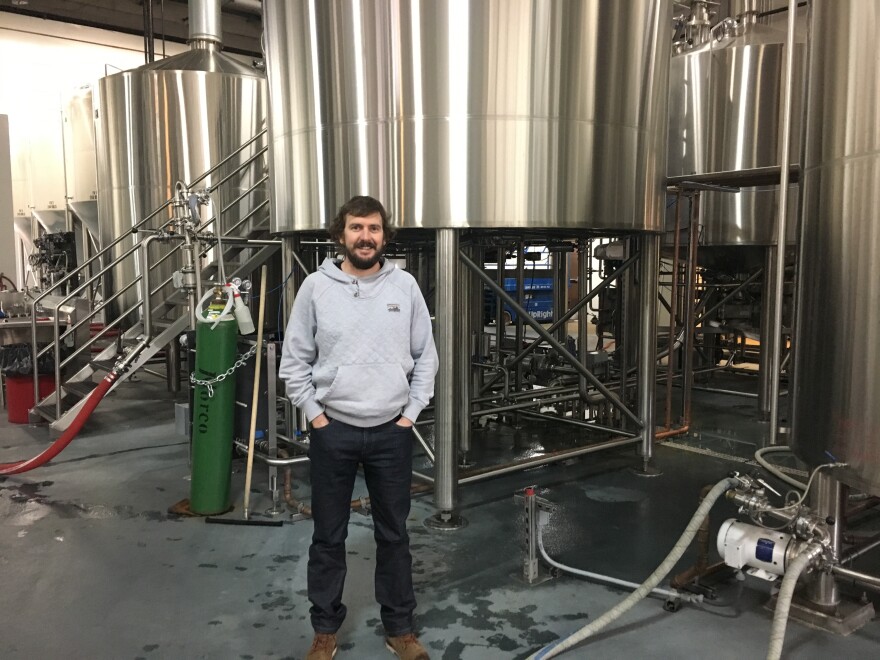On a recent winter afternoon, Mike Francis stood on the brew deck at Payette Brewing Company in Boise. He pointed to four large stainless steel vessels surrounding him.
"Each vessel is used throughout the process and it goes from one to the other," says Francis. "The advantage of having a four vessel system compared to our [previous] two vessel, is [that] each one does individual parts of it and it also allow us to have more batches going at once.”
Francis grew up in Boise and went to college in Seattle, where he was inspired by the Northwest craft beer movement of the early 2000s. He knew that his hometown didn’t have a brewery with big distribution aspirations and he saw an opportunity.

“I looked at Boise saying ‘Boise doesn’t have that.’ The production brewery didn’t really exist.”
He opened Payette Brewing in Garden City in 2010 and the brewery quickly became a leader in Idaho's nascent craft beer scene. The beers had Idaho-themed names like North Fork Lager and locals embraced the young start-up from the get-go.
“During that time it grew faster than I had expected," says Francis. "Right off the bat it was a pleasant surprise.”
In seven years, Payette grew exponentially and the company began shipping the Idaho beer to six neighboring states. But Francis knew it was important to stay connected to their local customers by building a larger tap room in their new facility, which opened in 2016.
"Local wins in every single market. So the further away we get from here, the less local we are." - Mike Francis, Payette Brewing
These days, he says that tap room makes up about 30 percent of the company’s revenue while distribution lagged a bit last year because of one major hurdle:
“Local wins in every single market. So the further away we get from here, the less local we are.”
Chris Furbacher learned the value of localism when his parents purchased Grand Teton Brewing in 2009.
“You know the word ‘contracted’ isn’t always construed as a good thing," Furbacher says. "But in our case, I think it is.”

The eastern Idaho brewery is the oldest in the state, established by a home brewer in 1988. When Furbacher’s family bought it the beer was in 20 different states – many of them far beyond the Northwest.
“So we were spread pretty far," the marketing director says, "far and thin. "And one thing we made a conscious decision to do was get some deeper roots in our local market.”
He says the company’s deliberate rebranding as an Idaho brewery culminated in 2014 when Grand Teton introduced Ale 208, a session ale that has the Gem State written all over it.
“All the malted barley is all Idaho-grown, the hops are Idaho-grown, of course our water is glacial melt from the Tetons,” says Furbacher.
Predicting The Future Craft Beer Economy
Bart Watson with the national Brewers Association says Grand Teton's focus on local ingredients is a smart move.
“Being able to say that ‘We use a high percentage of Idaho hops, Idaho malt’ is going to be one thing to help Idaho brewers stand out in the marketplace."
Watson says the fierce competition Grand Teton and Payette Brewing are experiencing beyond their local markets is playing out in other established craft beer regions.
"I think the challenges [of] distribution will continue as we move toward a more mature competitive marketplace." - Bart Watson, Brewers Association
Although the double digit growth of craft beer from a few years ago is over, the economist says there’s still room for more businesses to sprout up in 2018.
“We see no change of the number of breweries slowing down, so we’re going to see more breweries opening. But most of them are going to be very small and locally-focused. I think the challenges [of] distribution will continue as we move toward a more mature competitive marketplace.”
But Watson says that localism shouldn’t be emphasized at the expense of flavor and quality.
In the West End neighborhood of Boise, there’s a new brewery that’s aiming to put quality and community on a level playing field right from the start.
Clairvoyant Brewing co-owner Mike Edmondson recalls how he and his two business partners came together to open last October after years of homebrewing.
“We would go places – whether it’s Portland or Bend or around in Boise – and we would have some craft beer and go ‘Man this is pretty good, but I like my beer better,’” says Edmondson.

Edmondson says they see themselves as a neighborhood bar with a brewery attached, and the up-and-coming West End has been excited to have them.
“People walk in the front door, and it’s like finding a new room in their house. They’re amazed, they’re like, ‘I didn’t know this was here! This is great, this is in my neighborhood. I can come down here and have a beer anytime I want.’ And we say ‘Yes you can!’”
Clairvoyant plans to produce about 400 barrels of beer this year. That’s about four percent of what Payette sold in 2017. Edmondson says although they want some distribution of their beer, you won’t find Clairvoyant labels outside the Treasure Valley anytime soon.
For now, staying small makes sense for Clairvoyant’s three owners – who all plan to keep their day jobs – and maintain their homebrewing ethos.
This story is part of the KBSX news series, "Distilled."
Find reporter Frankie Barnhill on Twitter @FABarnhill
Copyright 2018 Boise State Public Radio





